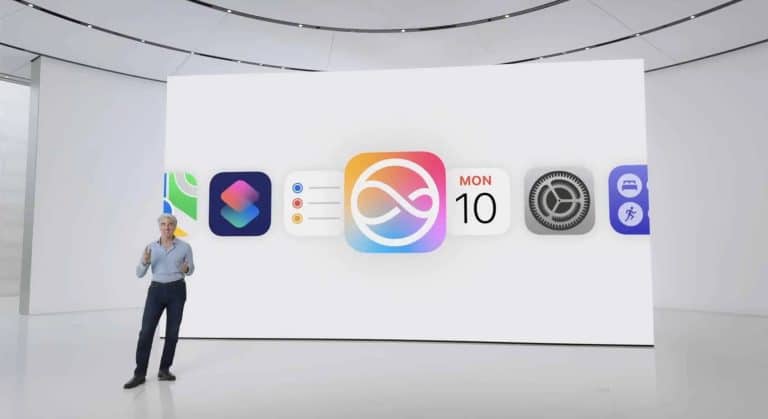Analyzing Apple's LLM Strategy For Siri's Enhancement

Table of Contents
Apple's Current LLM Landscape
Apple's AI and machine learning (ML) initiatives have long been characterized by a strong focus on privacy. Unlike some competitors who heavily rely on cloud-based processing, Apple prioritizes on-device processing to minimize data transmission and enhance user security. This privacy-first approach significantly impacts their LLM strategy. While Apple has not publicly disclosed detailed information about their specific LLM projects, it's widely believed they are investing heavily in internal development. This likely involves leveraging acquired companies and talent with expertise in natural language processing (NLP) and LLMs. They might also be exploring strategic partnerships, although the details remain largely confidential.
- Focus on on-device processing for privacy: This approach presents both advantages (enhanced user privacy) and disadvantages (limitations in processing power and model complexity).
- Limited public information on specific LLM projects: Apple's secrecy makes it difficult to assess the precise stage of their LLM development and implementation plans for Siri.
- Potential reliance on acquired companies and talent for LLM expertise: Acquisitions and talent acquisition are key strategies for Apple to quickly gain expertise in this rapidly developing field.
- Challenges of integrating LLMs into a privacy-focused ecosystem: Balancing powerful LLM functionality with the stringent privacy requirements of Apple's ecosystem poses a significant technical and engineering challenge.
Potential Enhancements to Siri via LLMs
The integration of LLMs promises to revolutionize Siri's capabilities. LLMs can significantly improve natural language understanding (NLU), enabling Siri to interpret more complex and nuanced requests. This would lead to more accurate and helpful responses, moving beyond simple commands to sophisticated conversational interactions. Furthermore, LLMs can power more contextual awareness, allowing Siri to anticipate user needs and provide proactive assistance.
- Improved conversational flow and multi-turn dialogue: Siri could engage in more natural, fluid conversations, remembering past interactions and context.
- Enhanced search and information retrieval capabilities: LLMs can improve search results and provide more relevant and comprehensive information.
- More accurate and helpful responses to complex requests: Siri could handle intricate instructions and questions far more effectively.
- Proactive suggestions based on user context and behavior: LLMs could anticipate user needs and provide personalized recommendations and assistance.
- Better handling of nuanced requests and ambiguous queries: Siri could understand the subtleties of human language and provide appropriate responses even with unclear input.
Challenges and Considerations for Apple
Integrating advanced LLMs into Siri presents substantial challenges. One major hurdle is the computational resources required. Running complex LLMs on-device requires significant processing power, which impacts battery life and device performance. Apple must carefully balance on-device processing for privacy with cloud-based processing for enhanced capabilities. Furthermore, they need to ensure the integration doesn't compromise Siri's user-friendly interface, a hallmark of its success.
- Balancing power consumption with performance: Finding the optimal balance between LLM power and device battery life is crucial.
- Ensuring data privacy and security with LLM integration: Maintaining Apple's commitment to user privacy is paramount in the development and deployment of LLMs for Siri.
- Maintaining Siri's intuitive and simple user experience: Complex LLM functionality shouldn't detract from the ease of use that defines Siri.
- Addressing potential biases and ethical concerns within LLMs: Mitigating biases and ensuring ethical considerations are addressed is crucial for responsible LLM integration.
Competition and Market Positioning
Apple's approach to LLM integration contrasts with that of competitors like Google and Amazon, who often prioritize cloud-based processing and broader data collection. Google Assistant and Amazon Alexa already leverage advanced LLMs, offering more sophisticated conversational capabilities. However, Apple's focus on privacy could become a key differentiator, attracting users concerned about data security. The success of Apple's LLM strategy will hinge on its ability to deliver significant improvements to Siri while upholding its privacy standards.
- Comparison of Siri's capabilities with other voice assistants: Currently, Siri lags behind competitors in terms of conversational AI and LLM integration.
- Analysis of Apple's competitive advantages and disadvantages: Apple’s privacy focus is a strong advantage, but their late entry into the advanced LLM market is a disadvantage.
- Prediction of future market trends in the voice assistant space: The integration of advanced LLMs will likely be a defining factor in the future competitiveness of voice assistants.
Conclusion
Apple's LLM strategy for Siri is a crucial element of its future competitiveness in the voice assistant market. While currently behind competitors in LLM adoption, Apple's commitment to privacy and its substantial resources provide a strong foundation for future advancements. Successfully integrating powerful LLMs while maintaining user privacy and a seamless user experience will determine whether Siri can regain its leading position. The challenges are substantial, but the potential rewards are significant. Stay tuned for further analysis of Apple's LLM strategy for Siri and its impact on the future of voice assistants. Understanding Apple's LLM strategy for Siri is crucial for anyone interested in the evolving landscape of AI and voice technology.

Featured Posts
-
 Allentown 4x100m Relay Team Sets New Penn Relays Record
May 21, 2025
Allentown 4x100m Relay Team Sets New Penn Relays Record
May 21, 2025 -
 Klopps Agent Comments On Replacing Ancelotti At Real Madrid
May 21, 2025
Klopps Agent Comments On Replacing Ancelotti At Real Madrid
May 21, 2025 -
 Outrun Video Game Movie Director Michael Bay Star Sydney Sweeney
May 21, 2025
Outrun Video Game Movie Director Michael Bay Star Sydney Sweeney
May 21, 2025 -
 Jaw Dropping Antiques Roadshow Episode Results In Arrest For National Treasure Trafficking
May 21, 2025
Jaw Dropping Antiques Roadshow Episode Results In Arrest For National Treasure Trafficking
May 21, 2025 -
 Preparing For School Delays A Guide To Winter Weather Advisories
May 21, 2025
Preparing For School Delays A Guide To Winter Weather Advisories
May 21, 2025
Latest Posts
-
 Protecting Yourself From Fast Moving Storms With Damaging Winds
May 21, 2025
Protecting Yourself From Fast Moving Storms With Damaging Winds
May 21, 2025 -
 Understanding The Dangers Of High Winds In Fast Moving Storms
May 21, 2025
Understanding The Dangers Of High Winds In Fast Moving Storms
May 21, 2025 -
 Damaging Winds And Fast Moving Storms A Guide To Protection
May 21, 2025
Damaging Winds And Fast Moving Storms A Guide To Protection
May 21, 2025 -
 Ftv Lives Hell Of A Run The Good The Bad And The Ugly
May 21, 2025
Ftv Lives Hell Of A Run The Good The Bad And The Ugly
May 21, 2025 -
 The Resilience Mindset Building Mental Strength And Wellbeing
May 21, 2025
The Resilience Mindset Building Mental Strength And Wellbeing
May 21, 2025
